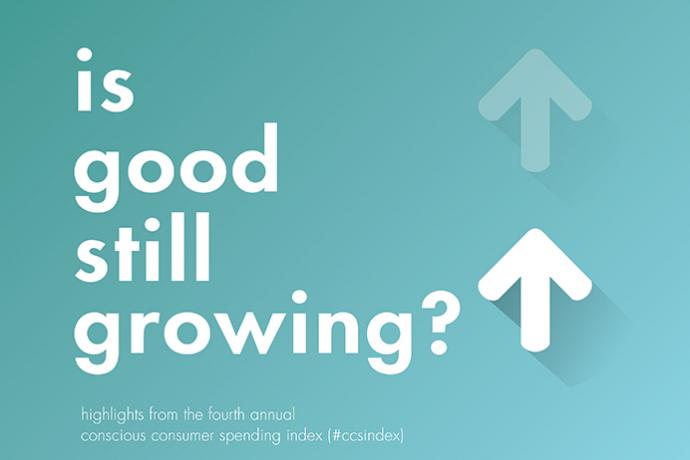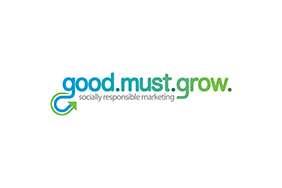Consumers Less Conscious as Fourth Annual Conscious Consumer Spending Index (#CCSIndex) Shows a Slight Dip in Socially Responsible Shopping
TOMS Repeats as Leader in Top 20 Good Company Poll, Honest Company Makes Biggest Climb, Amazon, Facebook Among Newly Ranked Orgs
Published 12-07-16
Submitted by Good.Must.Grow.
 Is Good Still Growing?
Is Good Still Growing?A two-year steady climb in social responsibility among consumers experienced a slip in 2016, according to the fourth annual Conscious Consumer Spending Index (#CCSIndex). In total, 1,012 Americans were polled this year for the ongoing benchmarking study, which is fueled by Good.Must.Grow. (GmG), a socially responsible marketing consultancy.
The 2016 study found that 31 percent of Americans are planning to spend more with companies who are socially responsible in the year ahead, slightly down from 32 percent the previous year. Additionally, 60 percent confirmed the importance of buying from socially responsible companies, down from 64 percent in 2015, and 64 percent reported making purchases from socially responsible companies, compared to 65 percent in 2015.
Overall, the #CCSIndex showed a slight drop from 48 to 46 on a 100 point scale. After two years of increases (from 45 in 2013 to 47 in 2014 and then up to 48 in 2015), the index showed its first decline since the inception of the study.*
“While a decrease is not what we expect or want to see from the index findings, the sky is not falling on socially responsible spending,” said Heath Shackleford, founder of Good.Must.Grow. “The important thing to keep in mind here is that two-thirds of consumers are buying socially responsible goods and services and nearly one-third are increasing the frequency of those purchases year-over-year, while avoiding socially irresponsible businesses. There is still a lot of activity and momentum in this space.”
The mild slide in conscious consumerism was seen throughout this year’s results. Consumers reported being slightly less likely to have recycled/favored reusable products contributed financially to a charity, or volunteered time to a charity, compared with the 2015 index findings. They also saw these activities as slightly less important than previous years of the study.
Sticker Shock Hampering Social Shopping?
When comparing intentions versus actions, 60 percent of consumers who planned to spend more responsibly in 2015 accomplished their goal, compared with 73 percent who had the same goal for 2014 and 76 percent in 2013.
Part of the drag on responsible spending may be a result of increasing sensitivity to premium price tags for socially conscious goods. In 2015, 37 percent of Americans said the cost of socially responsible products and services was the reason they didn’t follow through on their plans to spend more on “do good” purchases. In 2016, 40 percent of consumers cited price as a challenge to their consciousness, an increase that placed “price” just behind “knowledge of where to find socially responsible goods” as the leading factor negatively impacting socially responsible spending.
The power of the BOGO persists as well. Nearly half of respondents said they’d prefer to cash in a “buy one, get one free” offer from a store, rather than the retailer commit to giving away a similar product to someone in need or making a financial donation to a charity based on their purchase.
“This is heavy lifting,” said Shackleford. “A shift of this significance is going to experience stalls and setbacks. At the end of the day, we are rewiring the way business works in this country and changing core consumer behaviors that have been deeply embedded for decades. That requires patience and perseverance. The truth is the demand for ‘good business’ is absolutely there. I’d worry about the long-term prospects of any organization who doesn’t continue to take this movement seriously.”
Charities in Crisis?
In addition to a decline in donations of clothing and household items, volunteerism and the number of Americans financially contributing to nonprofits, there’s more bad news for charities. In 2015, 18 percent of Americans said they preferred to “give back” by purchasing socially responsible products, versus donating to charities or through a combination of both activities. In 2016, that number rose to 22 percent. Nearly half (47%) of these respondents believed purchasing socially responsible products was a more effective way to support positive change, while 40 percent cited the convenience of giving back while shopping.
Despite waning engagement with charities, the news wasn’t completely negative. When asked about the effectiveness of various groups to create positive change in society, 70 percent of Americans said nonprofits were effective. This was roughly 20 percentage points higher than social enterprises, major corporations, local government and almost 30 percentage points higher than the federal government, while only trailing individuals (72%) for the highest rating overall. Additionally, those committed to charities are all in, as 25 percent of Americans said they planned to increase their financial contributions next year, compared to 24 percent in 2015 and 18 percent in 2014.
Top 20 Good Company Poll
This year marked the #CCSIndex’s second annual top 20 “Good Company” poll, compiled by responses to the question, “What company or organization do you think of first when you think of socially responsible companies/organizations?” Based on unaided recall by respondents, organizations were ranked based on how frequently they were named. This year’s top 20 is an eclectic mix of organizations that includes well-known social enterprises, Fortune 500 brands and iconic nonprofits.
Rankings are as follows:
1. TOMS
2. Red Cross
3. Starbucks
4. Goodwill
5. Microsoft
6. Walmart
7. Whole Foods
8. Google
9. The Honest Company
10. Target
11. Apple
12. Facebook
13. Salvation Army
14. Ben & Jerry’s
15. Greenpeace
16. Proctor & Gamble
17. United Way
18. Amazon
19. Tesla
20. Burt’s Bees
TOMS repeated as the top vote getter in 2016. Meanwhile, five companies exited the poll (Chick-fil-a, Habitat for Humanity, Trader Joes, GE, Costco) making way for five new entrants (Amazon, Burt’s Bees, United Way, Tesla, Facebook). The Honest Company was this year’s biggest upward mover, climbing from 16th place to 9th place. For the second straight year, almost 30 percent of respondents (28%) failed to name a socially responsible organization.
Additional Findings:
When evaluating organizations at the corporate level, how a company treats its employees was the leading indicator of social responsibility for the fourth straight year (43% rating it as very important). Meanwhile, impact on the environment was next with 40 percent, followed by transparency (35%), corporate oversight (31%) and finally impact on society (29%).
In the #CCSIndex regional analysis, the South turned in a score of 48 in 2016 after climbing from 42 in 2014 to 50 in 2015. The Midwest continued a three-year slide, dropping from a leading index score of 54 in 2014, to 47 in 2015 and now 45 in 2016. The West also trended downward to 49 in 2016, after a slight increase from 2014 (50) to 2015 (51). Despite the dip, the West now leads all regions. The Northeast clocked in at 47, splitting the difference in its 2015 score of 53 and its 2014 score of 45.
Trust doesn’t always come “naturally” to consumers. While more consumers expressed their unwavering faith in organizations who claim to be socially responsible (11% always trust such entities in 2016, up from 6% in 2015), the vast majority of Americans still need reassurance when evaluating companies with a conscious (63% percent sometimes trust). Respondents were also asked to validate the trustworthiness and importance of various terms used to describe or label socially responsible products and services. The highest rated term in the list for importance was “natural” with 25% of Americans saying it was very important to their purchase decisions. Meanwhile the same term ranked toward the lower end in trust factor, as only 17% of Americans said they were very confident when seeing that word on a product label.
There remains a gap between men and women in terms of their engagement in social responsibility. Women were more likely to view socially responsible spending as important (67% vs. 52%). Women were also more likely than men to have purchased from socially responsible companies (69% vs. 59%) and have bigger plans for spending more in the year ahead (34% vs. 26%).
About the Study
This study was conducted in partnership with Supportive Research Solutions and What They Think Research. Sampling was provided by Research Now. Data was collected Oct 28-Nov 7, 2016. In total, 1,012 Americans were surveyed. Margin of error is +/-3%. For more information on the Conscious Consumer Spending Index, please visit www.goodmustgrow.com/ccsindex
*Scoring Adjustments
After closely observing the outcomes from the first three years of this study, the scoring algorithm for the #CCSIndex was modified in 2016 to more accurately detect movements in conscious consumerism. By increasing the sensitivity of the scoring mechanism, the index now more specifically reflects smaller scale shifts in social responsibility. This allows for a more precise representation of subtle changes in importance, behavior and intent. The original methodology produced a score of 65 in 2013, 68 in 2014 and 68 again in 2015.
About Good.Must.Grow.
Good.Must.Grow. provides strategic marketing support for socially responsible businesses, nonprofit causes and organizations that are focused on health + wellness. We want to be part of a revolution that drives societal change by sparking increased charitable giving and community involvement as well as unprecedented levels of corporate social responsibility. Proud to be a Certified B Corp. See how we’re #GrowingGood at http://www.goodmustgrow.com.

Good.Must.Grow.
Good.Must.Grow.
At Good.Must.Grow. we provide strategic marketing support for socially responsible businesses, nonprofit causes and organizations that are committed to making our world a healthier place. Learn how we are #GrowingGood at www.goodmustgrow.com.
More from Good.Must.Grow.

